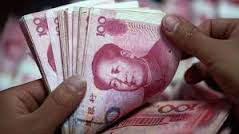 Britain’s vote to exit the European Union (EU) has thrown a lifeline to emerging-market companies facing an $800 billion wall of maturing debt.
Britain’s vote to exit the European Union (EU) has thrown a lifeline to emerging-market companies facing an $800 billion wall of maturing debt.
By hindering the Federal Reserve’s plan to raise interest rates, the referendum result has led to speculation borrowing costs will remain lower for longer as policy makers attempt to prevent Europe’s turmoil turning into a recession. This means developing-nation companies that borrowed when it was cheaper to do so won’t have to pay more to service those bonds, at least for now.
The prospect of fewer defaults shows how the so-called Brexit vote is proving a blessing for developing-nation companies that need to pay back about $200 billion per year from 2017 to 2020. Economists from the International Monetary Fund (IMF) to the Bank for International Settlements have been warning Fed monetary tightening may set off an increase in corporate failures in emerging markets. Defaults have been climbing since 2013 and reached a seven-year high in the second quarter.
“We might even see a decline in default rates again in the third and fourth quarters of this year,” said Apostolos Bantis, a Dubai-based credit analyst at Commerzbank AG, who recommends investing in Latin American company bonds. “The overall outlook now is more positive for emerging-markets corporates because the Fed is very unlikely to move any time soon following the Brexit.”
Uncertain outcomes
The policy uncertainty engulfing the developed world has boosted the appeal of emerging countries, usually viewed by investors as more vulnerable to political risk. Yields on a Bloomberg index tracking developing-nation corporate bonds have fallen 27 basis points to 5.19% since the UK vote, adding to a recovery that started when oil prices began rebounding from a 20 January low.
The sentiment shift means that defaults are probably past their peak, according to Kathy Collins, an analyst at Aberdeen Asset Management in London. By 28 June, S&P Global Ratings had recorded 10 emerging-market corporate defaults in the second quarter, the worst quarterly tally since mid-2009. The rating company’s 12-month junk-bond default rate climbed to 3.2% at the end of May from 2.9% at the end of April.
“Given where commodity prices are at the moment, we’re not expecting too many more defaults,” Collins said. “In the first six months of this year, we’ve seen a lot of companies be very proactive in terms of tenders and buybacks in the market.”
Buying back
Russia’s Novolipetsk Steel PJSC and shipping operator Sovcomflot OJSC have announced they intend to buy back debt totaling as much as $2 billion. Latin American bonds sales surged over the past week, which HSBC Holdings Plc partly attributed to an increased likelihood of “ultra-low global policy rates” for longer. Brazilian meat packer Marfrig Global Foods SA sold $250 million of securities to repurchase outstanding notes in a push it said would “lengthen its debt maturity profile and reduce the cost of its capital structure.”
The issuance boom may prove short lived if the prospect of Fed tightening re-emerges. The UK’s vote to end its 43-year association with the EU has also ushered in a period of uncertainty for global markets that may eventually turn investors off developing-world assets. In June, the BIS reiterated a warning that emerging market non-bank borrowers that have accumulated $3.3 trillion in dollar debt are coming under strain as their economies slow and currencies weaken.
“If we get some volatility in emerging markets, say from political noise coming from the EU, and there is no access to capital markets from some issuers, that could be really negative,” Badr El Moutawakil, an emerging-market credit strategist at Barclays Plc in London said.
Even after the Brexit dust settles, looming elections in the US, Germany, France and possibly the UK mean a lengthening list of potentially disruptive events, strengthening the hands of dovish central bankers. Emerging-market companies have raised $3.71 billion of international bonds since the UK’s referendum on 23 June.
“External factors are more supportive,” said Bantis from Commerzbank. “The default trend of the past quarter is unlikely to continue.” Bloomberg
Source: http://www.livemint.com/Politics/sCZ90ORt2l0cm0rnS0DIqJ/Brexit-offers-lifeline-on-800-billion-emerging-company-debt.html







